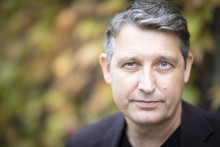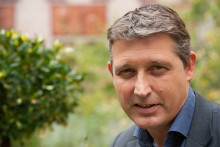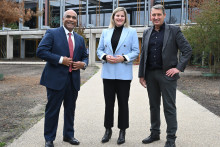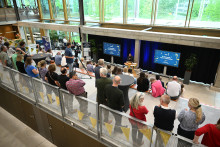How did the message land in the faculty last Wednesday?
'First of all, we informed the department heads and the faculty council in the morning, and at the end of the afternoon the meeting was held for the entire faculty. I found the reactions very constructive, even though there are of course concerns and tensions with such a drastic message. It's difficult in such a situation not to get emotional, I fully understand that.'
And for you?
'I found it emotional and intense to proclaim this message. You have to keep it very businesslike at such a moment, to prevent your emotions from taking over. I find it very difficult. But I also absolutely do not want to run away from my responsibility. This is the situation, we want to solve it ourselves. Fortunately, we also receive support, for example when it comes to legal issues.'
You saw the financial blows coming some time ago, can you explain the causes for this reorganisation?
'It was indeed coming, I made no secret of that. But now it is really a fact. Since Budget Day, we knew that we would receive another 14.5 percent less budget from the 'Official Development Assistance' funds, on top of the measures that had already been implemented. Then you are talking about an extra austerity task of 3 million euros per year. You can no longer tackle that with our current organisation.'
'After Budget Day, we took a closer look at what our picture looks like. We concluded that we still had 2.5 million euros to gain, whereby we could increase our income by 5 tons per year. But that still left 2 million euros in expenditure. If you consider that about 80 percent of our costs consist of personnel costs, we could only conclude that this required a reorganisation.'
Because it was inescapable? As the University Council indicated on Wednesday, 'the need and necessity must be clear in advance, to avoid discussions afterwards'?
'Unfortunately, we concluded there was no other way. We wrote a plan in which it had to be clear whether this was really necessary, what it would mean financially and structurally, how we should enter the process and what criteria we would gauge against.'
Those criteria are already clear at the moment?
'Yes. For the academic staff, we gauge it in two areas. First of all, how their profile fits in with Minister Klever's agenda. In addition, we test how they fit in with ITC's mission and vision. That mission and vision are linked to the minister's agenda. It is quite complex, but in the end it is also quite simple: we receive earmarked money from the Ministry of Foreign Affairs. Their agenda is leading. For support staff, we look at how they fit in with our sharpened mission and vision, while also looking at a healthy ratio between support and academic staff – in line with how the UT is committed to this. In total, that amounts to about twenty people that we have to dismiss.'
Now that this has been announced, what does the follow-up process look like?
'The faculty council must first advise whether this categorisation is the right one for such an organisational change. Then it is important to write an organisational plan and personnel plan. We want to get as much input as possible from the faculty and want to be transparent about this process. That is why, for example, the plan that has been presented last year will also be posted on our intranet. Above all, we want to create and maintain support. But we also have to be honest enough that not everyone can be involved in everything. The plans must be finalized and all input collected before the summer – both inside and outside the faculty. Once the faculty council has approved the reorganisation plan, the plan is to hold talks in October with the people who are directly affected.'
ITC is the second faculty in a short period of time to enter into a reorganisation, after Science & Technology. Have lessons already been learned from that reorganisation that ITC can do something with?
'We have been in constant contact with TNW. I don't want to go into too much detail on the S&T reorganisation. Besides, the substantive choices that S&T makes are different from our choices. We are also too different in terms of content. Look, there are things at S&T that went well and that didn't go so well. We can learn from this in our process, for example about how things are done and experienced on a communicative level. However, I have no illusions that we are going to do everything perfectly. These kinds of processes are simply too difficult and drastic for that.'
How do you see the future of the faculty?
'A reorganisation is painful and drastic. However, I do not see it as a purely financial exercise. For example, we also had consultancy firm Fundatis advise on our culture and structure. For more than a year – before Budget Day – a number of working groups have been set up to make ITC more efficient and future-proof. The need to apply strategic focus and develop the organisation and processes to these adjustments had already been set in motion. We are confident that the faculty will ultimately emerge stronger, I will continue to insist on that. We are not going to lose sight of our future perspective.'






